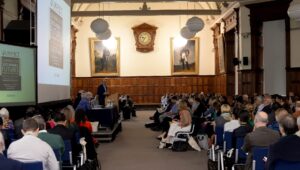In 1979, two Birmingham businessmen, the Ozanne brothers, decided to launch a new education journal, the International Journal of Educational Development, to fill a perceived niche in the market. They were concerned about the cynicism that they encountered in developing countries with regard to the so-called ‘experts’ who arrived for brief visits and then felt able to write definitive reports. They were also concerned that the importance of education in the development discourse was being squeezed out by economists. They therefore aimed to publish a journal containing articles based on research into policy and practice in the developing world which might influence policy-makers.
The first two volumes of the journal were published by W.I. Ozanne and Associates Ltd., and were printed by a firm in Hong Kong, but it became apparent that this system was economically not viable. Bill Ozanne, therefore, approached Pergamon Press in Oxford to see if they would like to add the journal to their social science portfolio. They agreed enthusiastically, beginning with Volume 3, Number 1 in 1983. Elsevier Science Ltd. later took over the Pergamon imprimatur and continued to publish the journal, which is now recognised as one of the leaders in the field. To celebrate the first 10 years of the International Journal of Educational Development, it was agreed to host a conference in Oxford. Thus the first International Oxford Conference on Education and Development was held in September 1989 and attracted over 80 participants from 26 different countries. Read More
At the 2020 AGM, Keith Lewin our outgoing Chair of Trustees shared his reflection on UKFIET read it here
See UKFIET Conference themes from 1989 to date
UKFIET has been a registered charity since 2006, with Operational Guidelines which were last revised in 2020. Every other year for the past 30 years, the UKFIET Conference in Oxford has brought together hundreds of practitioners, researchers, consultants and policy-makers to debate the evidence, consider the impact and influence the policies of actors and agencies involved in education and development.



